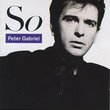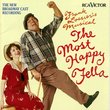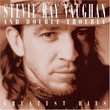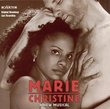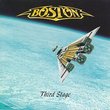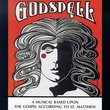| All Artists: Heitor Villa-Lobos, Robert Wright & George Forrest, Evans Haile, Orchestra New England, Judy Kaye, George Rose, Faith Esham, Kevin Gray, Jerry Hadley Title: Magdalena (1989 Concert Recording) Members Wishing: 0 Total Copies: 0 Label: Sony Release Date: 10/10/1989 Genres: Soundtracks, Broadway & Vocalists Style: Musicals Number of Discs: 1 SwapaCD Credits: 1 UPC: 074644494525 |
Search - Heitor Villa-Lobos, Robert Wright & George Forrest, Evans Haile :: Magdalena (1989 Concert Recording)
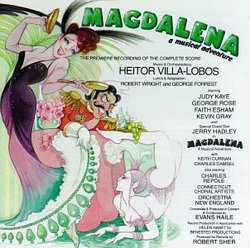 | Heitor Villa-Lobos, Robert Wright & George Forrest, Evans Haile Magdalena (1989 Concert Recording) Genres: Soundtracks, Broadway & Vocalists
|
Larger Image |
CD DetailsSimilarly Requested CDs
|
CD ReviewsSome of the greatest music ever written for Broadway Alan | New York, NY | 12/11/2003 (5 out of 5 stars) ""Magdalena" is a strange work, with its bizarre plot moving back and forth between Colombia and Paris. Conceived as a Broadway operetta, much of the music is more accessible on an initial hearing than in most contemporary opera, but is far more complex than almost any other Broadway musical I know, even the most musically complex ones. Burdened by a reputedly awful book (as you will easily believe if you read the plot synopsis included with this recording), it didn't last long on Broadway. Fortunately, approximately 40 years after the Broadway production, there was a concert of the music, which led to this recording. Most of the music is astounding. A couple of numbers have awkward moments, perhaps because Villa-Lobos didn't speak much English, but the overwhelming majority of the score is stunning. Much as I love Sondheim, Weill, and Bernstein, I'm not sure if any of them ever wrote music for Broadway that is quite as amazing as the best of what can be heard here. The lyrics are far from the greatest, which is not surprising since they are in service of a silly plot. But the music is what counts. The performance has some imperfections, but they are fairly minor. The orchestral writing is of a complexity far beyond what is typically heard in Broadway musicals, so complex that it might well prove daunting to major symphony orchestras. But under Evans Haile's conducting, Orchestra New England plays it very well indeed. The Connecticut Choral Artists also do well, though the high tessitura of some of the choral music occasionally causes some audible strain for the sopranos. The three leading roles are also tremendously demanding by Broadway standards. Kevin Gray sings Pedro, the show's hero. There are times when a more robust basic sound would be welcome, but Gray projects the words well and thankfully brings some humor to the role. Once you get used to his somewhat light timbre, it's clear that he does it very well. Faith Esham, in the soprano-ingenue role, sometimes has a matronly sound that doesn't quite suit the role. Conversely, Judy Kaye sometimes sounds a bit too glamorous and attractive for her rather dark role. Esham is further burdened by some impossible dialogue, which she does not handle with aplomb. Overall, though, Esham copes well with the vocal demands of the wide-ranging music. Her best singing here is terrific. And Kaye, in great voice and with her exceptional skills as a singing actress operating at full strength, triumphs in her role, even if a slightly darker sound might have been preferable at times. The supporting cast is strong. Most of all what is best about this recording is that this frequently thrilling music can at last be heard. This is an awesome piece of writing by one of the 20th century's great composers. If you're interested in obscure, musically ambitious Broadway musicals, you may find this CD very satisfying. And if you love Villa-Lobos but don't yet have this, don't hesitate. EDIT on 10/26/08: Up till a couple of days ago, there were seven or eight helpful votes for this review. Then all of a sudden, they all disappeared. I asked amazon but only got answers that made no sense." An unfortunate flop just chock-full of glorious music! Bob Zeidler | Charlton, MA United States | 10/19/2004 (5 out of 5 stars) "I consider myself an admirer of Heitor Villa-Lobos, with a rather large library of his music, both well-known and not-so-well-known. But never in my wildest imagination did I ever expect to run across this particular work, largely buried in obscurity. It was, in fact, a "chance" discovery; a CD that I picked up while attending an Orchestra New England concert earlier this year: a venue gift shop purchase, failing which I would otherwise not have been aware of it. (As it turned out, this was the only recording involving the Orchestra New England that I didn't already have, at least among those which were on sale. Since I'm somewhat of a fan of this orchestra, how could I NOT get it?) "Magdalena" - in 1948 - may well have been the most adventurous mounting ever of a musical-theater production destined for Broadway. Variously described as a folk opera (a la "Porgy and Bess"), an operetta, and a musical, it has some of the aspects of all of these, and, had it been the success for which it had been predicted, would have topped anything before or since in terms of musical and production values. (Only Leonard Bernstein's "West Side Story" seems to come close to it in terms of elaborate production values; only his "Candide" seems to match it in terms of fantasy. But that's good company to keep!) The informative booklet notes fully describe the preparation for production, and the cast of those involved in various stages of the development of the production reads like a "Who's Who" in the industry. Needless to say, Villa-Lobos leads everyone involved in terms of renown, and he ended up writing some truly glorious music for the work. Those familiar with the widest possible range of his works won't have much difficulty identifying the music with him, despite the unfamiliar-to-him genre: "Magdalena" is full of familiar Villa-Lobos touchstones of melody, harmony and rhythm, if only one knows what to listen for. (Villa-Lobos even pays tribute to Darius Milhaud, a close personal friend who captured the essence of Brazil in his "Saudades do Brasil," by including a bit of early Parisian jazz that might well have been written by Milhaud.) The book and lyrics (by the same team responsible for the 1941 smash hit, "Song of Norway," with the book by Frederick Brennen and Homer Curran and lyrics by Robert Wright and George Forrest, is - like many such books and lyrics for operettas - more than slightly on the fanciful side, and probably far too complex for it to have been a success in some later dumbed-down era. After brief but successful runs in Los Angeles and San Francisco, the work was brought to New York, where, after 88 additional successful performances over three months, it simply died. Not because of the weight or complexity of the book (which were nonetheless considerable), but because, thanks to an extended musicians' union strike, it became impossible to broadcast or record the production - or even just highlights from it - in order to drum up business in the usual fashion. The strike was, not to mince words, the kiss of death for that production. Given the elaborate nature of the work, a fully-staged revival has, so far, never occurred, and perhaps never will. Fortunately, this unstaged concert-version performance does a fine job of reminding us of what a good work, at least in terms of its musical values, "Magdalena" had been. It requires "legit" voices (Sarah Brightman need not apply), and some splendid ones have been assembled for this concert-performance recording, including Judy Kaye and George Rose (both well-regarded stalwarts for this type of work), and even Jerry Hadley for a relatively small part. While there is some spoken dialogue (all in English) and some of the lyrics might well make some cringe today, the singing - both solo and chorus - is truly glorious, representing Villa-Lobos at his most melodic, and reason enough to give this rarity a try. As good as the singing is - and it is VERY good - the orchestral writing by Villa-Lobos is equally stunning and effective. This is not your ordinary pit orchestra (although Orchestra New England DID get its start as the Yale Theatre Orchestra), but a rather large group of instrumentalists numbering about 40. I for one cannot imagine utilizing a smaller orchestra, something that seems to be an economic necessity today (what with synthesizers replacing multiple performers as stage pits get smaller and pit orchestra budgets get squeezed). Interestingly, the orchestra credits include a clarinetist who doubles on tenor and baritone sax, but yet there are nice parts there that seem to be scored for alto sax. I don't know if my hearing is starting to go, or if there is a typo in the orchestra personnel listing. Hopefully the latter. Forget that particular solecism. For that matter, forget that the book and lyrics are on the far side of far-fetched. This is a terrific performance of "a bit of musical-theater history," not soon to be repeated. And the music IS glorious! A fascinating trek off the beaten path, easily worth 5 stars! Bob Zeidler" For lovers of good MUSIC Bob Zeidler | 04/23/2001 (5 out of 5 stars) "Maybe we should try to forget genres and expectations when we listen to music. If you're expecting a typical Broadway Musical, then you probably won't like this--too much dissonance and music in a minor key to be one of those. I was lucky enough to have a completely objective introduction to it. I came in after the beginning of a broadcast on the radio in Spain. All the way through I was wondering what it could be, but I knew that I liked it. Finally, it was announced as an operetta! I would probably never have listened to it had I heard that at the beginning. It certainly doesn't sound like one. It also doesn't sound like a lot of other Villa-Lobos music. It is, as the subtitle says, a musical adventure. I think that if you approach it as such, you're likely to enjoy it. So, open your mind and let the music flow in!"
|

 Track Listings (17) - Disc #1
Track Listings (17) - Disc #1